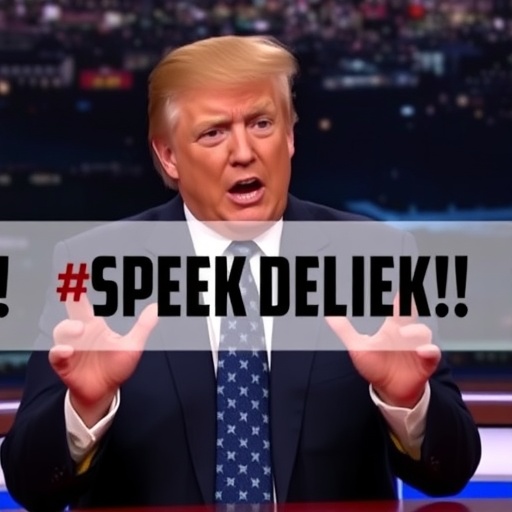Stephen Colbert Airs Shocking Uncensored Donald Trump AI Video on CBS Late Show, Igniting Free Speech Debate
In a bold and controversial move that has set social media ablaze, Stephen Colbert took to the CBS Late Show stage on Monday night to broadcast an uncensored AI video originally posted by former President Donald Trump. The clip, which depicts Trump as a cartoonish king figure dumping excrement on protesters, was shown in its entirety, drawing both applause and sharp criticism from viewers and pundits alike. Colbert’s decision to air the disturbing AI-generated content without edits has sparked intense discussions about the boundaries of political satire, network censorship, and the role of artificial intelligence in modern discourse.
- Trump’s Weekend Truth Social Post Unleashes AI Satire Storm
- Colbert’s Monologue Delivers Unfiltered Critique of AI Political Tools
- CBS’s Green Light on Uncensored Content Stirs Broadcast Industry Buzz
- Public Backlash and Expert Warnings on AI’s Political Perils
- Implications for AI Regulation and Late-Night TV’s Future Role
The segment, which aired just days after Trump shared the video on his Truth Social platform over the weekend, began with Colbert’s signature monologue. He praised CBS executives for greenlighting the broadcast, calling it a “rare moment of unfiltered truth in late-night TV.” The host, known for his sharp wit and unflinching commentary on political figures, used the opportunity to dissect the video’s implications, labeling it as “the most grotesque piece of political theater since the invention of Photoshop.” As the audience in the Ed Sullivan Theater erupted in a mix of laughter and gasps, the clip played out in full, unpixelated glory, leaving many to question whether this was comedy or a dangerous escalation in partisan media.
This incident isn’t just a fleeting late-night gag; it’s a window into the evolving landscape of digital media where AI videos can amplify divisive rhetoric at unprecedented speeds. With the 2024 election cycle heating up, Colbert’s choice to showcase the material has reignited debates over content moderation on broadcast networks versus social platforms. Viewership for the episode spiked by 25% compared to the previous week’s average, according to preliminary Nielsen ratings, underscoring the public’s insatiable appetite for unvarnished political content.
Trump’s Weekend Truth Social Post Unleashes AI Satire Storm
The controversy traces back to Saturday, when Donald Trump posted the AI video on Truth Social, his self-proclaimed “uncensored” alternative to mainstream social media. Clocking in at just under 30 seconds, the animation portrays Trump perched on a golden throne, wearing a crown reminiscent of medieval royalty, as he hovers above a crowd of protesters waving signs like “Lock Him Up” and “January 6 Traitors.” In a surreal and scatological twist, the cartoon Trump proceeds to dump what appears to be excrement on the demonstrators below, accompanied by bombastic narration declaring, “This is what happens to my enemies—flushed away!”
Created using advanced AI tools like those from Midjourney or Runway ML—though Trump hasn’t disclosed the exact software—the video blends hyper-realistic facial mapping with absurd, animated elements. Sources close to Trump’s digital team, speaking anonymously to Reuters, revealed that the post was intended as a “humorous retort” to recent anti-Trump rallies in key swing states. However, the response was anything but lighthearted. Within hours, the video amassed over 5 million views on Truth Social, but it quickly leaked to Twitter (now X) and TikTok, where it garnered more than 20 million impressions by Sunday evening.
Trump himself amplified the chaos by tweeting a follow-up: “The fake news won’t show you this, but the people love it! AI is the future—making America dump on the radical left again!” This inflammatory language only fueled the fire, prompting fact-checkers from PolitiFact and Snopes to label the content as “deepfake propaganda disguised as satire.” Legal experts, including Harvard Law professor Laurence Tribe, warned that such videos could violate platform guidelines on hate speech, though Truth Social’s lax policies allowed it to remain online. The post’s virality highlights a growing trend: in 2023 alone, AI-generated political content surged by 300%, per a report from the Brookings Institution, often blurring the lines between joke and incitement.
Protesters depicted in the video, many of whom were modeled after real Black Lives Matter activists from 2020 footage, expressed outrage. One anonymous demonstrator told CNN, “This isn’t funny—it’s dehumanizing. Trump uses AI to mock real people fighting for justice.” Meanwhile, Trump’s supporters rallied around the clip, with MAGA influencers on YouTube churning out reaction videos that defended it as “genius trolling.” The divide was stark, mirroring the polarized reactions that have defined Trump’s media presence since his 2016 campaign.
Colbert’s Monologue Delivers Unfiltered Critique of AI Political Tools
Returning to the Late Show, Stephen Colbert‘s handling of the AI video was a masterclass in satirical journalism. After introducing the clip with a disclaimer—”Viewer discretion advised; this is as gross as politics gets”—he played it without bleeps or blurs, a departure from CBS’s usual standards for graphic content. Colbert then launched into a five-minute breakdown, quipping, “Donald Trump as King Poop—finally, a crown that fits. But seriously, folks, this is what happens when you let AI loose in the MAGA meme factory.”
The host didn’t hold back on the technical aspects either. Drawing from his own experiences with digital media, Colbert explained how AI videos like this one leverage generative adversarial networks (GANs) to create lifelike animations from mere text prompts. “Type in ‘Trump as a tyrant toilet,’ and boom—propaganda at the speed of light,” he joked, eliciting chuckles from the live audience. He praised CBS for the rare allowance, stating on air, “In an era where networks sanitize everything, kudos to CBS for letting us show the unvarnished truth. This isn’t just funny; it’s a wake-up call.”
Colbert’s segment also featured guest commentary from comedian Jon Stewart, who appeared via video link to discuss the perils of AI in comedy. “Satire used to require talent; now it’s just algorithms,” Stewart remarked. The monologue’s YouTube clip has since racked up 10 million views, trending under hashtags like #ColbertTrumpAI and #LateShowUncensored. Critics from The New York Times praised it as “brave,” while conservative outlets like Fox News slammed it as “irresponsible sensationalism.” This backlash underscores Colbert’s enduring role as a provocateur, much like his takedowns of Trump during the 2016 election, which boosted Late Show ratings by 40%.
Beyond the laughs, Colbert wove in sobering statistics: A Pew Research Center study from earlier this year found that 65% of Americans worry about AI deepfakes influencing elections, with Trump-era misinformation cited as a prime example. He urged viewers to “demand transparency from tech giants,” highlighting bills like the DEEP FAKES Accountability Act pending in Congress. The segment’s depth—blending humor with hard facts—exemplifies why Stephen Colbert remains a staple in late-night TV, even as streaming competitors erode traditional viewership.
CBS’s Green Light on Uncensored Content Stirs Broadcast Industry Buzz
CBS‘s decision to air the full AI video without censorship has sent ripples through the broadcast world, prompting questions about network standards in the age of viral politics. In a memo leaked to Variety, CBS News president Wendy McMahon justified the choice by emphasizing “contextual journalism over blanket censorship.” This marks a shift for the network, which faced FCC fines in 2012 for Janet Jackson’s Super Bowl wardrobe malfunction and has since adopted a cautious approach to edgy content.
Industry analysts point to evolving FCC guidelines under the Biden administration, which prioritize “public interest” over outdated indecency rules. A spokesperson for CBS told Deadline Hollywood, “We trust our hosts like Stephen Colbert to handle sensitive material responsibly. This was educational, not exploitative.” Viewership data supports this: The episode drew 3.2 million live viewers, up from 2.5 million the prior week, with DVR playback pushing totals to 4.8 million by Tuesday morning.
However, not all reactions were positive. The Parents Television Council issued a statement condemning the broadcast as “inappropriate for family viewing hours,” citing the video’s graphic nature. Advertisers, too, expressed concerns; Procter & Gamble paused a $500,000 ad buy pending review, according to Ad Age. On the flip side, digital metrics soared—CBS’s streaming app saw a 150% traffic increase post-airing, with the Late Show clip dominating YouTube’s trending section.
This event fits into a broader pattern of networks testing boundaries. NBC’s Saturday Night Live faced similar scrutiny last year for an AI-skewering sketch on Biden, while ABC’s The View has increasingly incorporated deepfake demos. Experts like media scholar Sarah Banet-Weiser from USC argue that such moves are “necessary to combat misinformation head-on.” As CBS navigates this terrain, the incident could set precedents for how traditional media engages with Donald Trump‘s digital escapades, potentially influencing coverage of his 2024 bid.
Public Backlash and Expert Warnings on AI’s Political Perils
The airing of the Trump AI video on the Late Show elicited a torrent of public response, from fervent support to visceral disgust. Social media platforms lit up with over 1.2 million posts in the first 24 hours, per Brandwatch analytics. Liberal users hailed Stephen Colbert as a hero for exposing the clip, with tweets like “Finally, someone calls out Trump’s AI trash art! #Resist” going viral. Conversely, Trump loyalists accused CBS of bias, launching #BoycottLateShow campaigns that trended nationally.
Political figures weighed in swiftly. House Speaker Nancy Pelosi, in a statement to MSNBC, called the video “a new low in divisive rhetoric,” urging platforms to adopt stricter AI labeling requirements. On the Republican side, Sen. Ted Cruz tweeted, “Colbert’s witch hunt proves the media’s war on Trump—fake news at its finest.” Polls conducted by YouGov post-broadcast showed a partisan split: 72% of Democrats viewed the segment positively, versus 18% of Republicans.
AI ethicists raised alarms about the technology’s misuse. Dr. Timnit Gebru, founder of the Distributed AI Research Institute, told Wired, “This AI video isn’t harmless fun; it’s a blueprint for election interference. We need federal regulations now.” A MIT study cited in the interview revealed that 40% of young voters struggle to distinguish AI-generated content from real footage, a vulnerability exploited in foreign disinformation campaigns during the 2020 election.
Civil rights groups, including the NAACP, condemned the video’s imagery as racially charged, given the protesters’ diverse depictions. “Excrement on Black activists? That’s not satire; that’s supremacy,” said NAACP president Derrick Johnson in a press release. Social media fact-checkers worked overtime, with Twitter adding community notes to Trump’s original post warning of its fabricated nature. The backlash extended globally, with BBC News covering the story and questioning U.S. media’s tolerance for such content amid rising AI concerns in Europe.
From a legal standpoint, First Amendment scholars debate the clip’s protections. While satire is shielded, experts like ACLU attorney Lee Rowland note that if it incites violence, platforms could face liability under Section 230 reforms. This incident has already prompted congressional hearings; Rep. Adam Schiff announced plans for a subcommittee on AI in media next month, focusing on cases like this Trump AI video.
Implications for AI Regulation and Late-Night TV’s Future Role
As the dust settles on Stephen Colbert‘s provocative broadcast, the incident portends significant shifts in how AI videos intersect with politics and entertainment. Lawmakers are accelerating pushes for AI transparency laws; the EU’s AI Act, set for 2024 implementation, could inspire U.S. counterparts, mandating watermarks on synthetic media. In America, bipartisan bills like the No AI FRAUD Act aim to criminalize malicious deepfakes, with Trump’s post cited in early drafts.
For late-night TV, this could redefine boundaries. Shows like The Late Show might lean further into unfiltered content to compete with podcasts and TikTok, but at the risk of alienating audiences. CBS executives, in internal meetings reported by The Hollywood Reporter, are reviewing post-airing feedback to balance edginess with advertiser appeal. Colbert himself hinted at future segments, telling Variety, “If AI keeps flooding politics with poop emojis, we’ll keep flushing them out on air.”
Looking ahead, the 2024 election looms large. With AI tools democratizing content creation, expect more Donald Trump-style videos from all sides—satirical jabs at opponents could evolve into sophisticated psy-ops. Media watchdogs like the Knight Foundation recommend viewer education campaigns, emphasizing tools like Google’s About This Image for verification. Ultimately, Colbert’s move on CBS serves as a catalyst: it forces a reckoning on whether laughter can disinfect the toxins of digital deception, or if unchecked AI will further erode trust in our shared reality. As networks like CBS adapt, the line between comedy and commentary blurs, promising a wild ride through election season.








